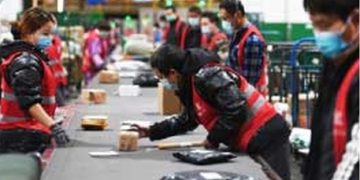A few days after placing her order, Wang Maiqi received the pick-up notice from a courier station in her neighborhood. She habitually puts her used parcel boxes into the receptacle at the station’s recycling counter and gets a virtual egg on her mobile app.
“When collecting four eggs, the platform would deliver the real ones to my home free of charge,” said Wang, a resident in the city of Taiyuan, north China’s Shanxi Province. “It’s a win-win action with the old packaging recycled and consumers getting tangible benefits.”
In the annual Singles’ Day shopping bonanza this year, a total of 60,000 courier stations under Alibaba’s logistics arm Cainiao Network have sent out 7.5 million eggs for consumers who recycle their parcel boxes.
The shopping festival, first initiated by Alibaba on November 11, 2009, is now getting greener, becoming a new “battlefield” where companies are trying to make a difference amid the country’s efforts to reduce carbon emissions.
Alibaba’s e-commerce platform Tmall issued 100 million yuan (about $15.6 million) in green vouchers this year, encouraging consumers to buy energy-efficient home appliances and products with “green” certificates to support the country’s carbon-reduction goals.
E-commerce giant JD.com has also joined the “low-carbon” campaign, developing recyclable packaging, deploying new-energy cargo vans and adopting photovoltaic power generation in warehousing.More than 150 million green products were among the commodities on JD.com’s shelves during this year’s shopping festival. The company said the energy-efficient air conditioners, refrigerators and televisions that customers bought from JD.com last year could help reduce carbon emissions by nearly 2 million tonnes annually.
After China announced it would strive to peak carbon dioxide emissions before 2030 and achieve carbon neutrality before 2060, the ambitious targets were lauded by all sectors. – CGTN
- Latest
- Trending





